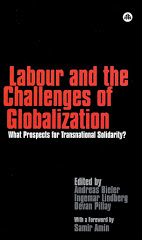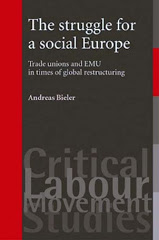China is generally regarded as the new economic
powerhouse in the global political economy. Some even talk of an emerging
power, which may in time replace the US as the global economy’s hegemon. And
yet, there is a dark underside to this ‘miracle’ in the form of workers’ long
hours, low pay and lack of welfare benefits. Increasing levels of inequality
have gone hand in hand with widespread working conditions characterised by
super-exploitation. Nevertheless, Chinese workers have not simply accepted
these conditions of exploitation. They have started to fight back. In a new
special issue of the journal Globalizations, co-edited by Chun-Yi Lee
and myself, the contributors have analysed these various forms of resistance by
Chinese workers and the way they are organised. In this blog post, I will
provide a brief overview of the contents of this special issue.
Showing posts with label social relations of production. Show all posts
Showing posts with label social relations of production. Show all posts
Monday, 29 August 2016
Tuesday, 16 August 2016
Super-exploitation and resistance: different forms of workers protests in China.
China is
frequently considered to be an example of successful developmental catch-up.
And yet, the country’s impressive growth rates are to a large extent based on
the super-exploitation of its workforce expressed in long working hours, low
wages, and a general lack of basic welfare benefits such as medical insurance
and work-injury insurance (Chan
and Selden, 2014, p. 606). In our recently published
article ‘Exploitation and resistance: a comparative analysis of the Chinese
cheap labour electronics and high-value added IT sectors’, published in the journal Globalizations and freely accessible online,
Chun-Yi Lee and I compare the electronics sector in the area of Shenzhen, based
on cheap labour assembling goods for export, with the IT
sector in the area of Shanghai, relying
on a more skilled workforce manufacturing high-value added goods. It is asked in what way these rather different
locations within the global political economy condition the form and contents
of resistance in these two sectors.
Thursday, 4 September 2014
The importance of Piketty: What perspective from the Left?
Thomas Piketty’s book Capital in the Twenty-First Century (Harvard
University Press, 2014) has received widespread attention within academia, the
media, amongst the Left and across the general public. His criticism of
increasing inequality has made him an attractive read for everyone concerned
about the devastating results of global capitalism. In this blog post, I will
critically reflect on the implications of this attention for the Left.
Thursday, 5 June 2014
Analysing exploitation and resistance: the centrality of class struggle.
Monday, 2 September 2013
Democratic global Keynesianism as a way out of crisis? Critical reflections on Heikki Patomäki’s The Great Eurozone Disaster.
When the financial market crisis in 2007 and 2008 threatened the global
economy, governments around the world stepped in and bailed out many financial
institutions, which were on the brink of collapse. Large amounts of private
debt were transformed into public debt. In the Eurozone, this resulted in the
sovereign debt crisis. In his excellent book The Great Eurozone Disaster:
From Crisis to Global New Deal (Zed Books, 2012), Heikki Patomäki not only provides an
insightful analysis of the crisis, but he also makes clear recommendations for the
best way out of crisis.
Friday, 15 February 2013
Globalisation and the erosion of the Nordic model
In 2007 the Finnish employers’ confederation withdrew from
the comprehensive tripartite, multi-sector bargaining system, a step which had
been taken by the Swedish employers’ federation 17 years earlier. In Sweden, it
signalled to some extent the demise of the so-called Swedish model. In Finland,
by contrast, Finnish employers organised in EK and here especially
the Federation
of Finnish Technology Industries, which represents
Finnish export companies, did not succeed in enforcing company level bargaining
and, thus, more flexibility in wage structures. Instead, a sectoral collective
bargaining system, giving sectoral trade unions significant power, was
established. How can we understand this failure in comparison to the more
successful attack of the Swedish employers in the 1990s? In this blog post, I will argue
that the far lower degree of transnationalization of production in Finland
explains to some extent why the attack on the established class compromise
happened much later than in Sweden and has been less successful. Nevertheless, I will also conclude that trade unions must remain vigilant in their protection of the welfare state as further attacks are likely.
Sunday, 11 November 2012
Reflections on a progressive research strategy on European labour
On Tuesday, 6 November I participated in a
workshop on the ‘Future of Trade Unions and Unions Research’ in Berlin,
organised by the Hans Böckler Stiftung and the Wirtschafts- and Sozialwissenschaftliches Institut (WSI). The purpose of the workshop was to try to envisage the role of
unions in past, present and future research on Europe’s political economy writ
large. In this post, I will reflect on what key aspects of an innovative
research project on the future of European trade unions could look like. In
more detail, I will identify three key aspects: (1) the importance of
conceptualising the implications of the changing social relations of
production; (2) the potential role of trade unions beyond the workplace; and
(3) the necessity to learn from the Global South.
Tuesday, 9 October 2012
Can Chinese Workers Eat Apple?
On
24 September, the iPhone 5 was launched in the first nine countries/areas,
America, United Kingdom, France, Germany, Canada, Singapore, Japan, Australia, Hong
Kong. It was then launched in 22 more countries in the week beginning 1
October. The first weekend’s sales were very impressive, reaching 5
million. This number already broke Apple’s previous record for first-weekend
sales of all previous models of iPhone. In this guest post, Chun-Yi Lee wonders whether any of those Apple fans, who were
camping outside to be ‘the first customer’ or at least ‘first group of
customers’ to buy the iPhone 5, had thought about the making of
this most advanced, light, cool gadget? This paper links the hot-selling
phenomenon of the iPhone 5 to Chinese workers, for the very reason that
most of Apple’s iProducts are manufactured in China.
Monday, 1 October 2012
A socialist alternative through the Labour Party? Reflections on transformative politics.
On Tuesday, 25 September 2012, I attended a local Labour Party meeting in Beeston, Nottingham/UK. Invited guest speakers were the left-wing Labour MP and Chair of the Labour Representation Committee (LRC) John McDonnell and the General Secretary of the Commercial Workers’ Union (CWU) Billy Hayes. There was a clear agreement on the need to replace the current ConDem government. There was less agreement on how to ensure that a renewed Labour government would actually stand up for working people this time round.
In this post, I will critically assess both speakers’ suggestions by drawing on the work of Karl Marx and Nicos Poulantzas.
Monday, 2 July 2012
Workers of the World Unite?
I have just published the article ‘“Workers of the world, unite?” Globalisation and the quest for transnational solidarity’ in the journal Globalizations. In this article, I discuss the structural setting of labour agency at this point in time and evaluate two broad responses by trade unions and social movements, the Decent Work, Decent Life initiative as well as the Labour and Globalisation Network.
Wednesday, 25 January 2012
New Labour's moral capitalism!
In a speech on 19 January 2012, the Labour Party leader Ed Miliband demanded a moral capitalism with a special emphasis on the protection of consumers. What he overlooks, however, is that the real causes of inequality and exploitation are rooted in the social relations of production. Interventions at the level of consumption will not rectify this.
Subscribe to:
Posts (Atom)












